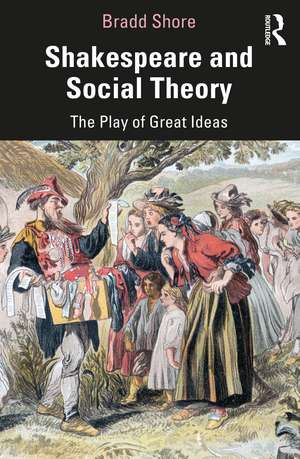Shakespeare and Social Theory: The Play of Great Ideas
Autor Bradd Shoreen Limba Engleză Paperback – 23 aug 2021
Close readings of a selection of frequently studied plays—Hamlet, The Winter’s Tale, Romeo and Juliet, A Midsummer Night’s Dream, Julius Caesar, and King Lear—engage with the texts in detail while connecting them with some of the biggest questions we all ask ourselves, about love, friendship, ritual, language, human interactions, and the world around us. The plays are examined through various social theories including performance theory, cognitive theory, semiotics, exchange theory, and structuralism. The book concludes with a consideration of how “the new astronomy” of his day and developments in optics changed the very idea of “perspective,” and shaped Shakespeare’s approach to embedding social theory in his dramatic texts.
This accessible and engaging book will appeal to those approaching Shakespeare from outside literary studies but will also be valuable to literature students approaching Shakespeare for the first time, or looking for a new angle on the plays.
| Toate formatele și edițiile | Preț | Express |
|---|---|---|
| Paperback (1) | 356.44 lei 6-8 săpt. | |
| Taylor & Francis – 23 aug 2021 | 356.44 lei 6-8 săpt. | |
| Hardback (1) | 1002.95 lei 6-8 săpt. | |
| Taylor & Francis – 23 aug 2021 | 1002.95 lei 6-8 săpt. |
Preț: 356.44 lei
Nou
Puncte Express: 535
Preț estimativ în valută:
68.20€ • 71.41$ • 56.57£
68.20€ • 71.41$ • 56.57£
Carte tipărită la comandă
Livrare economică 09-23 aprilie
Preluare comenzi: 021 569.72.76
Specificații
ISBN-13: 9781032017167
ISBN-10: 1032017163
Pagini: 290
Ilustrații: 26
Dimensiuni: 156 x 234 x 15 mm
Greutate: 0.45 kg
Ediția:1
Editura: Taylor & Francis
Colecția Routledge
Locul publicării:Oxford, United Kingdom
ISBN-10: 1032017163
Pagini: 290
Ilustrații: 26
Dimensiuni: 156 x 234 x 15 mm
Greutate: 0.45 kg
Ediția:1
Editura: Taylor & Francis
Colecția Routledge
Locul publicării:Oxford, United Kingdom
Public țintă
General, Postgraduate, Undergraduate Advanced, and Undergraduate CoreCuprins
Part 1. Shakespeare’s World 1. To See and Not to See: Hamlet’s Undiscovered Country 2. Shakespeare, In Theory 3. Revolutions Part 2. Four Plays 4. The Long Way Home: The Winter’s Tale and the Triumph of Time 5. And the Flesh Was Made Word: Romeo and Juliet in the Kingdom of Cratylus 6. Just For Play: Unmasquing A Midsummer Night’s Dream 7. The Body Politic, The Body Poetic: Julius Caesar and Legacy of "The King’s Two Bodies" Part 3. Shakespeare’s Craft 8. Just Nothing: How King Lear Means 9. Shakespeare and Theory in Perspective
Notă biografică
Bradd Shore is Goodrich C. White Professor Emeritus of Anthropology at Emory University, USA. A psychological and cognitive anthropologist, he has authored some 65 scholarly papers and three books.
Recenzii
"This book significantly extends and enriches our sense of Shakespearean drama. The plays, in Bradd Shore’s anthropological reading, are not only narratives, the unfolding of events and characters, but also enacted ideas; the ideas partake of philosophy, social theory, political science, the full range of human thought and behavior. Shore is not reading between the lines, but in the fullest sense reading the lines, with an awareness of their history and intellectual context."
Stephen Orgel, J. E. Reynolds Professor in Humanities, Emeritus, Stanford University
"Bradd Shore has managed to bring together some of the classic texts of modern anthropology with several of Shakespeare’s greatest plays. The result is a kind of interpretive kula ring, a gift exchange of mutual insight."
Stephen Greenblatt, John Cogan University Professor of the Humanities, Harvard University
Stephen Orgel, J. E. Reynolds Professor in Humanities, Emeritus, Stanford University
"Bradd Shore has managed to bring together some of the classic texts of modern anthropology with several of Shakespeare’s greatest plays. The result is a kind of interpretive kula ring, a gift exchange of mutual insight."
Stephen Greenblatt, John Cogan University Professor of the Humanities, Harvard University
Descriere
This book provides a bridge between Shakespeare Studies and classical social theory. The plays are examined through various social theories including performance theory, cognitive theory, semiotics, exchange theory and structuralism.
